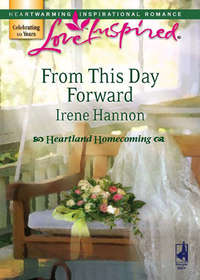
Полная версия
A Dream To Share
“Give it up, Mark,” Spencer said as if reading his mind. “I didn’t make this decision lightly. Nor is it negotiable.”
Biting back a sharp retort, Mark glared at his father. “I’m not the best person for this job.”
“You’re the perfect person.” The phone rang again, and Spencer reached for the handset. “Check in with me every few days. I want to be kept informed of your progress…Spencer Campbell here.”
Their conversation was over. No, Mark corrected. This hadn’t been a conversation. It had been an executive order. Picking up the folder, he wandered back to his office in a daze and sank into his leather desk chair. He was being sent to Hicksville, ill equipped for everything except the numbers part of his assignment.
Although he tried to remain angry, Mark didn’t succeed. Nothing had much power to evoke—or sustain—emotion in him. Besides, he’d been coasting for years. He supposed his father had a right to expect him to earn his keep. And, as heir apparent, to learn more about the business than how to crunch numbers.
Still, spending three months in the heartland of Missouri seemed pretty extreme. He’d survive, of course. As for learning anything, he suspected the only thing he’d gain would be a greater appreciation for big-city living.
Chapter Two
Dr. Sam Martin strode into his office, took his place behind the solid oak desk he’d inherited from his predecessor and opened Abby’s file. After giving it a quick scan, he looked at his patient.
“Everything appears normal, Abby. I assume you’re sticking to your diet, exercising, taking your medication?”
“Yes.”
“Good. How are you sleeping?”
“Okay.” That was stretching the truth. With the Gazette’s problems weighing on her mind, she was lucky to manage five or six hours a night. Less since Spencer Campbell had visited the week before.
One of Dr. Martin’s brows quirked up, and his next comment confirmed that he hadn’t missed the blue shadows under her eyes. “How’s the stress level?”
Startled, Abby stared at him. Had the Oak Hill grapevine tipped him off to the paper’s financial troubles?
The doctor leaned back and gave her an empathetic look. “I’ve heard rumors that the Gazette is having some problems.”
Cara must be his source of information, Abby speculated. Dr. Martin had just reconciled with his estranged wife, who’d moved to town and opened a restaurant at the Oak Hill Inn—and become fast friends with Marge Sullivan, the inn’s garrulous owner who knew everything about everybody in town.
“We’re having some financial issues,” she acknowledged.
“Fatigue and stress aren’t good for you, Abby. They’ll only exacerbate your condition. I’m sure Dr. Sullivan told you that, as well.”
“Yes, he did.” But what was she supposed to do? She was the editor. Dealing with problems was part of the job. “I’m working on some options.”
“Good. Until things settle down, I’d suggest you increase the frequency of your monitoring.”
“Okay.”
He closed her file. “I’ll see you again in six months. Call in the meantime if you have any problems.”
As Abby exited the office and stepped out into the August heat, she slowly exhaled. She hated doctor visits. Hated everything about the disease that had killed her mother at far too young an age and which she’d been diagnosed with just a few months ago.
Still, it could be worse, she tried to console herself as she slid behind the wheel of her car. And it might get worse unless she followed her doctors’ instructions. The diet, the exercise, the medication—that was all controllable. But Dr. Martin had homed in on the one thing in her life that wasn’t: stress. And neither of the options for the Gazette’s fate alleviated that.
Lord, help me get through this, she prayed as she drove down Main Street to the Chamber of Commerce meeting. Give me the courage to face whatever challenges lie ahead.
Marge Sullivan banged the gavel on the conference table and called the meeting to order. “Has anyone heard from Ali Mahmoud?”
The other Chamber members shook their heads.
“It’s not like him to be late,” Abby said.
“I know.” Marge propped a hand on her ample hip. “Maybe we should call the restaurant and…”
The door opened, cutting her off, and eight heads swiveled toward the black-haired man who entered. His swarthy skin seemed a couple of shades lighter than usual, and there were dark circles under his eyes. Deep creases on his forehead and around his mouth made him look far older than his forty-six years.
“Sorry I’m late.” He paused on the threshold, grasping the door frame.
A knot formed in Abby’s stomach and she started to rise. “Ali, are you all right?”
“Yes. But the restaurant…that’s another story.”
“Come and sit down,” Marge urged. “Tell us what happened.”
As he took his place, Abby poured him a cup of coffee.
“Thanks.” He gave her a wan smile and took a sip. “We had a fire just before dawn. In the kitchen.”
“How bad is it?” Marge asked, her eyes shadowed with concern.
“Not bad enough to shut us down. But if I hadn’t happened to go in extra early today to prepare for a private party…” He shook his head.
“What caused it?” Abby asked.
“Arson.”
Shocked silence greeted his response. Such crime was unheard of in Oak Hill.
“But who would do such a thing?” Abby asked when she could find her voice.
“That’s what Dale is trying to figure out.”
“And he will,” Marge declared.
In the year since he’d taken on the sheriff’s job Dale Lewis had earned the respect of the entire community. A hometown boy and former L.A. cop, he was sharp, thorough and tough when he had to be. Oak Hill was lucky to have him back, Abby reflected—a sentiment pretty much shared by everyone in town.
“I hope so. Because…well, there was more to it than just a fire.”
“What do you mean?” Marge asked.
“Whoever did this spray painted a message on the back door. Something very…unflattering about Allah. Then it said, ‘Go back where you came from.’”
An ominous chill ran down Abby’s spine. The fire had been a hate crime. Though Abby had read a great deal about such malicious attacks since 9/11, it had never occurred to her that such a despicable crime could come to Oak Hill.
“What did Dale say?” Abby asked.
“That he’d seen a lot of cases like this in L.A. And that it wasn’t always easy to track down the perpetrators. But he promised to do his best.”
“Well, if there’s anything we can do to help, you just let us know,” Marge said, before proceeding with the meeting.
An hour later, when the gathering broke up, Abby stopped to speak with Ali. “I can’t tell you how sorry I am about your trouble. Hate crimes are bad enough no matter who the victim is, but you were born and raised in the United States. You’re as American as I am. Despite what the message said, this is where you came from.”
“Things like this happened when I lived in Detroit, too. But not on this scale. Just snide comments, pranks, that sort of thing.”
“How can people behave that way?”
“Foreigners often meet with difficulties when they try to assimilate into a community. That’s just the way things are.” His tone was weary and resigned.
“You’ve been in Oak Hill for five years. And you’re not a foreigner.”
“I look like one. This kind of thing is hard to fight, Abby. Changing preconceived ideas, softening people’s hearts…it’s a difficult task.”
That was true. Still, prejudice in any form had always rankled Abby. She supposed it was a gene she’d inherited, considering that her grandfather had written bold editorials about race relations in the United States long before the national consciousness had been sensitized to the issue.
All at once an idea began to take shape in her mind. “It may be difficult, but it’s not impossible. Sometimes people just need a nudge.”
“Or a shove.” Ali summoned up a smile and placed his hand on Abby’s arm. “In any case, I know I have many friends here who have welcomed me and my family to the community. This is just an aberration.” He lowered his hand and checked his watch. “Now I have to run.”
“Be careful, Ali.”
He acknowledged her comment with a wave, and as he disappeared through the door Abby’s expression grew pensive. Maybe she couldn’t catch the perpetrator. That was Dale’s job. But at least she could do her part to soften a few hearts.
Abby tried to ignore her ringing phone. Her attention was focused on the computer screen in front of her, her mind forming the words more rapidly than she could type them as she composed an editorial about hate crimes. She should have forwarded her phone calls to Molly, the Gazette’s administrative assistant/receptionist. But she’d been so fired up when she’d returned from the Chamber meeting that she’d headed straight for her keyboard.
As the phone continued to ring, guilt prickled Abby’s conscience. A reporter never let a ringing phone go unanswered. That was a cardinal rule of journalism. Who knew when a hot tip might be coming in?
With an annoyed huff, she reached for the phone without breaking the rhythm of her typing. “Oak Hill Gazette. Abby speaking.”
“Abby Warner?”
“Yes.”
“This is Mark Campbell from Campbell Publishing. I believe you were expecting my call. If you have a few minutes, I’d like to discuss my visit.”
That got her attention. And broke the train of thought she’d been trying to hold on to. Aggravated, she swung away from her computer screen and closed her eyes. A dreaded doctor’s visit, a hate crime in their town and now this. Lord, how much do you want me to take in one day?
“Ms. Warner? Are you still there?” Impatience nipped at the edges of the man’s resonant baritone voice.
“Yes. Sorry. I was in the middle of something.”
“Would you like to call me back at a more convenient time?”
Yes. Like never, she wanted to say. But the finance board had already agreed to a review by Campbell Publishing. She had to deal with this.
“No. This is fine.” She tried to be cordial. But even to her own ears her tone sounded downright arctic.
“Okay. I’d like to begin Monday, unless that’s a problem.”
From his tone, Mark Campbell didn’t seem to be any more enthusiastic about his assignment than she was, Abby realized in surprise.
“That’s fine with me.”
“I’ll make the arrangements, then. Can you recommend a place to stay?”
“The only lodging in town is the Oak Hill Inn. It’s a B and B.”
“You mean one of those places where you have to share a bathroom down the hall with other guests?”
From his appalled inflection, it was clear that Mark Campbell considered such an arrangement uncivilized—and well beneath him. He’d probably never darkened the door of a B and B in his life. As an heir to a publishing empire, he was no doubt more accustomed to five-star hotels.
“No, the Oak Hill Inn is a bit more progressive than that. Every room has its own bath. They even have running water.”
“Fine.” The stiffness in his voice told her that her barb had hit home. “Do they have high-speed Internet access?”
She couldn’t quite contain her chuckle. “Sorry. This isn’t a big city, Mr. Campbell. If you want high-speed in your room, you’ll have to stay closer to Rolla.”
“How far away is that?”
“Thirty-five miles.” When he sighed, she spoke again. “However, you’re more than welcome to use the Net at our office.”
“I suppose that will have to do. Just give me the contact information for the inn.” Once she’d complied, he didn’t linger on the phone. “I’ll see you on Monday. What time would be good?”
“I’m always here by seven. I’ll see you then.”
“In the morning?”
“Well, I hardly think we’d be starting work at seven in the evening. Though I’m often here then, too.”
“Okay. Fine. I can do seven.”
As she hung up, Abby leaned back in her chair, her expression thoughtful. Mark Campbell seemed to be looking forward to this whole process about as much as she was. But that appeared to be about the only thing they had in common. Spencer Campbell’s son came across as a snob who was accustomed to a cushy life. He exhibited none of the fire and passion for the business that his father had.
Of course, she really shouldn’t jump to conclusions. Maybe he was just having a bad day. As she was.
And she didn’t think tomorrow was going to get much better.
Chapter Three
Seven o’clock came and went on Monday morning with no sign of Mark Campbell.
Somehow Abby wasn’t surprised. From their brief conversation, he hadn’t struck her as a morning person. But she wasn’t going to waste time worrying about his tardiness. She had a lot of work to do and she took her job seriously—even if he didn’t.
An hour later, when Abby answered her phone, he was on the other end.
“Ms. Warner? Sorry I didn’t arrive as scheduled. I, uh, missed my flight last night.”
“I hope there wasn’t an emergency at home.”
“No. It’s a…long story.” Actually, it wasn’t. He’d been at a party Sunday afternoon and lost track of the time—thanks to a gorgeous blonde who’d distracted him. When he’d at last thought to check his watch, he’d known he could never make his flight. But he wasn’t about to share that tidbit with Abby Warner. He already had the distinct feeling that she was less than impressed by him.
“In any case, I’m at O’Hare now, and we should be taking off in a few minutes,” he continued. “When we land in St. Louis I’ll drive directly to your office. That will take a couple of hours, right?”
“Yes.”
“Then I should be there no later than one o’clock.”
“We’ll look forward to seeing you.”
I’ll just bet, he thought, as he hung up. She sounded about as eager to see him as he was about trading his high-rise penthouse for a backwater B and B.
But maybe it wouldn’t be so bad. Maybe the town would be far more progressive and up to date than he expected. It might even offer an interesting diversion or two.
At least he could hope.
Several hours later his hopes were deflated. Oak Hill was worse than he’d thought.
As Mark drove down the town’s main street, which was baking in the late-August heat, he scanned the buildings on each side in dismay. It was like a Norman Rockwell slice of Americana—without the charm. A few cars were parked at the curb here and there, but the occupants hadn’t chosen to linger in the hundred-degree midday sun. They must have escaped into one of the tired-looking shops that lined the dusty street.
He saw a soda fountain, a feed store, and a bar and grill on one side. His gaze swept ahead. More of the same. No diversions there.
He switched his attention to the other side of the street. The Tivoli Theater looked promising, except the movie—only one movie, he realized—had played in Chicago weeks ago. There was also an antique store, a real-estate firm, a law office, a dentist, a bakery, a butcher shop. No Starbucks in sight.
In less than sixty seconds he came to the end of the two-block-long business district. How did people live in a place like this?
Shaking his head, Mark checked the street sign at the intersection. Spruce. This was it. His father had told him that the Gazette offices were only a couple of blocks off Main Street.
He turned left and drove past an elementary school, a church, the city hall and a few other businesses tucked in between residential property. No sign of the Gazette.
Backtracking, he recrossed Main Street. A small police station, a doctor’s office, more houses, a tiny library…and finally the Gazette.
Since the newspaper didn’t seem to have a parking lot, Mark eased his rental car next to the curb, under the shade of a towering oak tree. He took a couple of minutes to assess the building across the street he would call home during working hours for the next twelve weeks.
Unimposing would be far too generous a description, he decided. The small one-story white structure had a flat roof and was badly in need of a paint job. Two large windows flanked the front door, and the lettering on the Oak Hill Gazette sign above the entry was faded.
Mark frowned. Why on earth had this place caught his father’s attention? If the condition of the building was any indication, the Oak Hill Gazette had seen better days. From a fiscal perspective, it looked like more of a liability than an asset. The books would soon tell the story, and the good news was that it shouldn’t take him long to do a financial analysis on an operation this size. If the results were negative, maybe this trip would be shorter than he’d expected. Why linger for twelve weeks if the Gazette wasn’t a good acquisition?
His spirits lifting, he opened his door—then sucked in a deep breath as the oppressive saunalike heat slammed against his chest. Chicago could get hot, but this was ridiculous! The sooner he was out of here, the better.
Exiting the car, he was glad he’d opted for a jacket and open-necked shirt instead of a suit. But he was still sweltering. A film of sweat had already broken out on his brow. Grabbing his briefcase, he locked the door and made a beeline for the Gazette.
The air inside the office was cooler…but not cool enough. An ancient air conditioner was probably struggling to keep up with the blast furnace Missourians called summer. Mark flexed his shoulders, trying without success to convince the back of his shirt to release its uncomfortable grip on his skin.
“May I help you?”
A middle-aged woman came through a door at the back of the small reception area and looked at him over the top of her half glasses. A bit stocky, with streaks of gray in her short black hair, she regarded him warily.
“Yes. I’m Mark Campbell. Ms. Warner is expecting me.”
“Have a seat. I’ll let her know you’re here.” She gestured toward some chairs surrounding a low table, then moved toward a desk in the corner and picked up the phone.
Not exactly the warmest welcome he’d ever received, Mark reflected as he strolled toward the seating area. But then, most people didn’t like change—the very thing he represented.
He remained standing, staring out the window at the lifeless street, as she spoke in low tones on the phone behind him. A couple of minutes later he heard the door to the inner sanctum open again.
Mark wasn’t sure what he’d expected Abby Warner to look like. But when he turned, the petite woman in the doorway didn’t even come close to any of his preconceived notions. Slender and fine-boned, she couldn’t have been more than five-three or five-four. Her shoulder-length light brown hair, worn straight with a simple part on one side, was touched with appealing glints of copper, and her deep green eyes were fringed by long lashes.
Not that she was his type, of course. He preferred voluptuous blondes.
Still, he couldn’t help but notice that her face had character, for want of a better word, and the kind of classic bone structure that would age well.
As Abby watched Mark give her the once-over, her back stiffened. She was almost tempted to point out that he was supposed to be evaluating her business, not her body. But she held her tongue. A lot of good-looking men went through this kind of inspection with every woman they met. And there was no disputing the fact that the Campbell heir was good-looking.
At close to six feet, Mark Campbell was an imposing figure, with broad shoulders and a toned physique—the result of hours in an expensive health club, she guessed. His dark brown hair was cut short, and she’d put his age at midthirties.
As she finished her own survey, she caught the amused glint in the depths of his dark brown eyes. A warm flush crept up her neck. After faulting him for sizing her up, she’d done the same thing. Well, he’d started it. Lifting her chin, she forced herself to move toward him.
“I’m Abby Warner.” She held out her hand.
At closer range, Mark was struck by the intriguing flecks of gold in the woman’s eyes. And the editor of the Gazette seemed even more petite—and fragile—than she had at a distance. As his hand swallowed hers, he was almost afraid to squeeze for fear of breaking something. “Mark Campbell.”
“I hope you had a good trip, Mr. Campbell.”
“A hot one, anyway. And it’s Mark.”
“Welcome to August in Missouri.” Abby retrieved her hand. “That’s why we dress pretty casual here.”
He’d noticed. In contrast to his perfectly creased gray trousers, impeccable navy blue jacket and tailored blue-and-white-striped shirt worn open at the neck, she sported khaki slacks and a crisp short-sleeved blouse that made her look more like a college student than the editor of a newspaper. At least from a distance.
But now that she was a whisper away, he wouldn’t make that mistake. The fine lines at the corners of her eyes and faint parallel grooves in her brow belonged to a woman who’d known more than her share of fatigue and stress. Concerns about the future of the Gazette could be the cause, he reflected. In fact, hadn’t his father said something about the paper being a family business? He supposed it was time he reviewed the file that had been passed on to him.
Still, her personal problems weren’t his concern, he reminded himself. He was here to analyze the business, not the editor.
“I’ll keep the casual dress code in mind in the future,” he responded. “I can’t say that I’ll be sorry to ditch the jacket.”
A faint brief smile quirked her lips, vanishing as quickly as frosty breath on a cold day. “Would you like a tour now or would you prefer to settle in and come back a bit later? Or even tomorrow morning?”
“I’m up for a tour if this is a good time.”
She nodded, then gestured toward the receptionist. “I’ll just stick with first names for now. You’ve already met Molly. She handles all our administrative work and does double duty as our receptionist. This place would shut down without her.”
A pleased flush spread over the woman’s cheeks, and she rose as Mark walked over to shake her hand.
“How long have you been here, Molly? Twenty-one years?” Abby prompted.
“Twenty-two.”
A warm smile softened the tense lines of Abby’s face. The transformation was remarkable, and Mark caught himself staring. Fortunately Abby didn’t notice.
“All I know is that you’ve been here as long as I can remember,” Abby continued.
“That’s understandable, since you were only ten when I came.”
That made Abby thirty-two, Mark calculated, filing away that piece of information. He wasn’t sure why.
“In any case, Molly does a great job,” Abby noted. “Now let’s go back into the newsroom.”
It didn’t take long to complete the tour. The working space wasn’t large. Abby’s office and a conference room were the only enclosed areas. The rest of the area was divided into eight cubicles. As they moved from one to the other, he met the three reporters—Jean, Steve and Laura—as well as Marcia in marketing/sales, Jason in photography, Les in circulation and Paul in layout. Though Abby smiled at the staff members and their mutual respect was evident, she seemed to grow more subdued as the tour progressed.
He tried his best to put people at ease, insisting on first names and joking when appropriate, but the apprehension in the office was palpable. Was every operational audit this tense? he wondered. To him, an acquisition had always meant an evaluation of the books, an assessment of the effect on Campbell Publishing’s bottom line, done in the plush confines of his office. He’d never factored in the effect on people.
They ended their tour with Joe in accounting.
“How’s Cindy doing?” Abby greeted the sandy-haired man who looked to be in his late thirties.
“Okay. We’ll know more after the third ultrasound in—” he checked his watch “—two hours.”
“The ultrasound is today? Why on earth are you here?” Abby scolded him.









